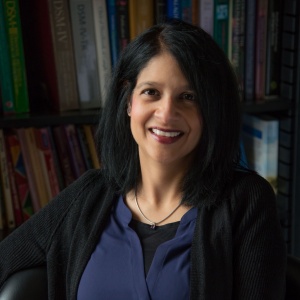
Saba Rasheed Ali works tirelessly to improve the lives of people in rural communities through several innovative initiatives.
Ali, who serves as the associate dean for research in the University of Iowa College of Education, created a program to inspire students in rural communities to pursue careers in health-related professions.
The program, Project HOPE (Healthcare Occupations Preparation and Exploration), is a STEM-based career education program design to connect minority and socioeconomically disadvantaged middle school students to the health science professions early in their education.
Project HOPE, which is in its tenth year, aims to get young people interested in healthcare careers early, so they are empowered to see themselves in professions ranging from doctors and nurses to paramedics, physician assistants, and dentists.
Project HOPE graduate students are active in several Iowa towns including Columbus Junction, West Liberty, Cedar Rapids, and Kalona.
She was inspired by her own experiences in rural communities. Growing up in rural West Virginia, her father was the only endocrinologist in a community highly-affected by diabetes. Her hometown has lacked access to an endocrinologist since her father retired.
“We see that students in rural communities don’t have the same access to information because they live in places where there is a restricted range of occupations,” Ali says. “Expanded exposure to health care professions helps students realize what is available and gets them thinking about how they can achieve those careers.”
Project HOPE culminates in a field trip to the UI campus, where students receive simulation experience in labs and get the opportunity to build a robot. The field trip helps change students’ perspectives on what a college education is like and what they can do in the healthcare field, she says.
Ali has seen positive short-term results from the program including documenting increases in student interest, confidence, and student expectations for the future.
In the long term, Ali hopes to see these students pursue healthcare careers in rural Iowa communities.
Ali, who is also a counseling psychology professor, was a recent recipient of a $1.3-million-dollar federal grant “Integrating Behavioral Health into Rural Medicine.” This grant is a collaboration between the College of Education Counseling Psychology program, the UI Mobile Clinic, and Grinnell College.
Over the course of four years, the grant will train and fund the placement of 28 counseling psychology PhD students in a dozen different locations across the state. The goal is to provide practicum experiences and training focusing on serving rural, veteran, and Latinx communities, with the hope of retaining these counseling psychology graduate students in rural communities.
“We are trying to get students to realize how they can be successful by practicing in rural areas and understanding the needs of people there,” Ali says. “We want them to think about the ways that they can contribute to the mental health of rural residents and consider a career providing services in rural areas.”
